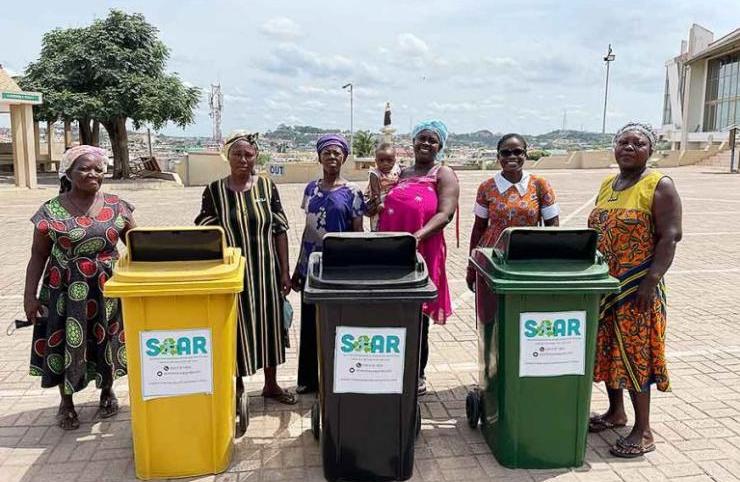Ghana. Women and Climate Change.

In harmony with Pope Francis’ call in Laudato Si’ to “care for our common home”, the Sisters of the Holy Cross have a long-standing commitment to ecological sustainability and systemic change across the globe. Among the Congregation’s initiatives to care for creation and God’s people is SOAR (Sisters Organizing and Advancing Recycling), a project launched by Sister Comfort Arthur.
She explains the initiative.
In Ghana, you can easily find water bottles and rubber sachets on the street. The polybag or plastic bags that we usually use are causing a problem in the country. Our beaches are filled with them. In terms of the gutters, our drains are also being blocked. Because of that, we have flood issues every year.
As a child, we used to have food served in plantain leaves rather than plastic bottles, bags, and other things. So, when the food is eaten and the leaves thrown away, the leaves can decompose to enrich the soil. It is only recently that plastic bags have become common in Ghana.
And look at what has happened! Even food, when it’s hot, is now saved in plastic bags. Can you imagine the chemical composition of plastic
and its effects?
I kept reflecting on what could be done because of the plastic waste being accumulated every day, creating a severe issue in my country.
Not only does this plastic waste deteriorate our environment, but, as I noted above, the plastic waste also clogs the drainage system
and causes floods.
The stagnant water causes water-borne diseases to spread more rapidly, and it also breeds more mosquitos that claim lives through malaria. And this is only the beginning of the impact of climate change in my country.
People can see plastic waste everywhere along the roadside, on the farm, and in the fields. Can you imagine what the farmers are struggling with? On the beaches, in our rivers and oceans, all life, both human and animal, is truly suffering.
Ghana is now filled with plastics. And we only recycle less than 2%! And so, I ask myself what can be done? As Sisters of the Holy Cross, we are committed to fostering models of development that care for our environment. We have considered how we can help the situation, clean up our country, save lives, and reduce our impact on climate change?
This is where the SOAR program came in. SOAR stands for Sisters Organizing and Advancing Recycling. The SOAR started as a pilot program in 2017 in Kasoa, located on Ghana’s southern coast.
Our mission is to utilize an integrated approach to waste management services, educate God’s people, care for the environment, and support the under-served.
Our vision is to be a leader in recycling, education, and action in Ghana. People are involved in our schools and parishes, especially women.
We were inspired by Laudato Si’ so that even if we cannot change the whole world at once, we can start from a small corner in Ghana. And hopefully, that light may grow and shine in other parts of the world, since climate change is a global concern.
We started by educating the public in the church. We talked to the parishioners after Mass about the importance of caring for our Common Home. We then provided recycling bins in the parishes and encouraged young members to fill them with plastics from home and around the church area. We didn’t stop there.
We then moved to schools and educated students, faculty, and staff about their role in making a difference and inspiring their family members to do the same as far as plastic waste is concerned. Also, there is global concern about what is happening in terms of climate change. Recycling bins were then placed outside the schools to collect plastics from home and the school compound.
Again, we moved ahead. We used the FM radio stations and other social media outlets to educate the general public. We knew we couldn’t do this work alone and so we decided to dedicate time and resources to organizing volunteers and individuals to help us collect the plastic waste. It was interesting how many women bought into the idea and started collecting a massive amount of plastic waste.
We paid the women for their hard work. Of course, we have to motivate them. This money supports them and their families to put something on their table and bring a smile to their families. Our aim and primary objective to help clean the environment then grew to include employment and job opportunities for women.
Five years after its humble beginning, SOAR is reaching incredible heights. We started with seven collection points in Kasoa. Today, the program boasts 33 collection hubs at six parishes and 11 schools in three cities – Kasoa, Cape Coast and Takoradi.
Many of the schools – where 3,600 students volunteer with the program – hold friendly competitions to see which can collect the most plastic waste. The students are enthusiastic. They take home what they learn about environmental issues and personal responsibility, sharing this new knowledge with family, friends and neighbours.
Along these years, we have aligned our mission with that of other climate change advocates and supporters. We know that when we heal the earth, which is the only home we have, we heal our neighbour. And when we heal our neighbour, we heal our relationships.



